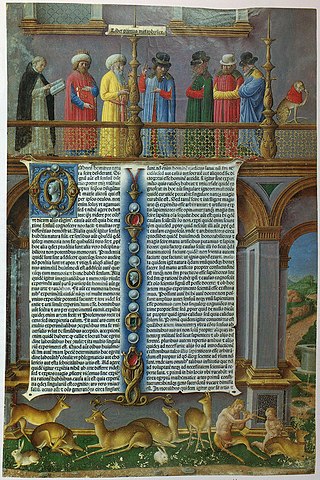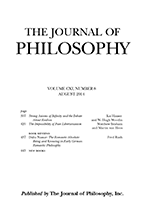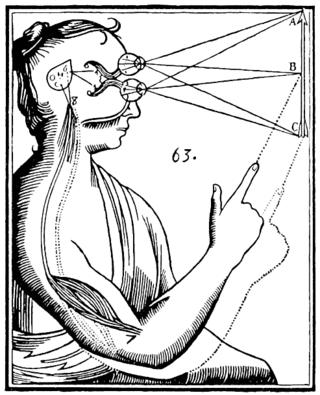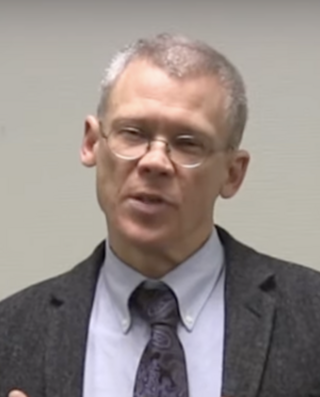Related Research Articles

Metaphysics is the branch of philosophy that examines the basic structure of reality. It is often characterized as first philosophy, implying that it is more fundamental than other forms of philosophical inquiry. Metaphysics is traditionally seen as the study of mind-independent features of the world, but some modern theorists understand it as an inquiry into the conceptual schemes that underlie human thought and experience.
Causality is an influence by which one event, process, state, or object (acause) contributes to the production of another event, process, state, or object (an effect) where the cause is partly responsible for the effect, and the effect is partly dependent on the cause. In general, a process has many causes, which are also said to be causal factors for it, and all lie in its past. An effect can in turn be a cause of, or causal factor for, many other effects, which all lie in its future. Some writers have held that causality is metaphysically prior to notions of time and space.

A thought experiment is a hypothetical situation in which a hypothesis, theory, or principle is laid out for the purpose of thinking through its consequences. The concept is also referred to as a Gedankenexperiment within the work of Ernst Mach and includes thoughts about what may have occurred if a different course of action were taken as opposed to what did in fact occur. The importance of this ability is that it allows us to imagine what may occur in the future, as well as the implication of alternate courses of action.

Hilary Whitehall Putnam was an American philosopher, mathematician, computer scientist, and figure in analytic philosophy in the second half of the 20th century. He contributed to the studies of philosophy of mind, philosophy of language, philosophy of mathematics, and philosophy of science. Outside philosophy, Putnam contributed to mathematics and computer science. Together with Martin Davis he developed the Davis–Putnam algorithm for the Boolean satisfiability problem and he helped demonstrate the unsolvability of Hilbert's tenth problem.

David Kellogg Lewis was an American philosopher. Lewis taught briefly at UCLA and then at Princeton University from 1970 until his death. He is closely associated with Australia, whose philosophical community he visited almost annually for more than 30 years.
Dorothy Margaret Doig Edgington FBA is a philosopher active in metaphysics and philosophical logic. She is particularly known for her work on the logic of conditionals and vagueness.

Carl Gustav "Peter" Hempel was a German writer, philosopher, logician, and epistemologist. He was a major figure in logical empiricism, a 20th-century movement in the philosophy of science. Hempel articulated the deductive-nomological model of scientific explanation, which was considered the "standard model" of scientific explanation during the 1950s and 1960s. He is also known for the raven paradox.
Bastiaan Cornelis van Fraassen is a Dutch-American philosopher noted for his contributions to philosophy of science, epistemology and formal logic. He is a Distinguished Professor of Philosophy at San Francisco State University and the McCosh Professor of Philosophy Emeritus at Princeton University.

Nancy Cartwright, Lady Hampshire is an American philosopher of science. She is a professor of philosophy at the University of California at San Diego and the University of Durham. Currently, she is the President of the Division for Logic, Methodology and Philosophy of Science and Technology of the International Union of History and Philosophy of Science and Technology.
Wesley Charles Salmon was an American philosopher of science renowned for his work on the nature of scientific explanation. He also worked on confirmation theory, trying to explicate how probability theory via inductive logic might help confirm and choose hypotheses. Yet most prominently, Salmon was a realist about causality in scientific explanation, although his realist explanation of causality drew ample criticism. Still, his books on scientific explanation itself were landmarks of the 20th century's philosophy of science, and solidified recognition of causality's important roles in scientific explanation, whereas causality itself has evaded satisfactory elucidation by anyone.
Robert Culp Stalnaker is an American philosopher who is Laurance S. Rockefeller Professor Emeritus of Philosophy at the Massachusetts Institute of Technology. He is a Fellow of the American Academy of Arts and Sciences and a Corresponding Fellow of the British Academy.

The Journal of Philosophy is a monthly peer-reviewed academic journal on philosophy, founded in 1904 at Columbia University. Its stated purpose is "To publish philosophical articles of current interest and encourage the interchange of ideas, especially the exploration of the borderline between philosophy and other disciplines." Subscriptions and online access are managed by the Philosophy Documentation Center.

Richard Newell Boyd was an American philosopher, who spent most of his career teaching philosophy at Cornell University where he was Susan Linn Sage Professor of Philosophy and Humane Letters Emeritus. He specialized in epistemology, the philosophy of science, language, and mind.
Paul Montgomery Churchland is a Canadian philosopher known for his studies in neurophilosophy and the philosophy of mind. After earning a Ph.D. from the University of Pittsburgh under Wilfrid Sellars (1969), Churchland rose to the rank of full professor at the University of Manitoba before accepting the Valtz Family Endowed Chair in Philosophy at the University of California, San Diego (UCSD) and joint appointments in that institution's Institute for Neural Computation and on its Cognitive Science Faculty.

The mind–body problem is a philosophical problem concerning the relationship between thought and consciousness in the human mind, and the body.
Causal analysis is the field of experimental design and statistics pertaining to establishing cause and effect. Typically it involves establishing four elements: correlation, sequence in time, a plausible physical or information-theoretical mechanism for an observed effect to follow from a possible cause, and eliminating the possibility of common and alternative ("special") causes. Such analysis usually involves one or more artificial or natural experiments.

Robert Charles ("Rob") Koons is an American philosopher. He is a professor of philosophy at the University of Texas, noted for his contribution to metaphysics and philosophical logic. Koons has also advocated for academic freedom and courses on Western civilization.

Martin Bunzl is professor of philosophy emeritus at Rutgers University in New Brunswick, NJ, where he directed the Rutgers Initiative in Climate and Social Policy from 2007 to 2011.
Laurie Ann Paul is a professor of philosophy and cognitive science at Yale University. She previously taught at the University of North Carolina at Chapel Hill and the University of Arizona. She is best known for her research on the counterfactual analysis of causation and the concept of "transformative experience."
Jan Faye is a Danish philosopher of science and metaphysics. He is currently associate professor in philosophy at the University of Copenhagen. Faye has contributed to a number of areas in philosophy including explanation, interpretation, philosophy of the humanities and the natural sciences, evolutionary naturalism, philosophy of Niels Bohr, and topics concerning time, causation, and backward causation (Retrocausality).
References
- ↑ Professor Profile: Ned Hall
- ↑ "Ned Hall". Archived from the original on 2017-01-01. Retrieved 2017-01-01.
- ↑ L. A. Paul and Ned Hall. Causation: A User’s Guide Review by Tim Maudlin
- ↑ "Professor Profile: Ned Hall | Magazine | the Harvard Crimson".